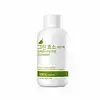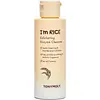What's inside
What's inside
 Key Ingredients
Key Ingredients

 Benefits
Benefits

 Concerns
Concerns

No concerns
 Ingredients Side-by-side
Ingredients Side-by-side

 Reviews
Reviews

Ingredients Explained
These ingredients are found in both products.
Ingredients higher up in an ingredient list are typically present in a larger amount.
These enzymes break down protein into smaller peptides and amino acids. They also encourage the formation of new protein.
Our skin uses peptides, amino acids, and protein for maintaining healthy skin cells.
Protease work by breaking peptide bonds in protein with hydrolysis. This is the process of breaking bonds using water.
An in-vitro study (not done on a living organism) found a blend of 3-protease decreases skin inflammation by mitigating the effects of other proteins.
One manufacturer that uses subtilisin, a protease from Bacillus subtilis, claims this ingredient is exfoliating, promotes cell regeneration, and is a good substitute for AHAs. Further research is needed to back up these claims.
Fun fact: The human body contains ~641 protease genes.
Learn more about ProteaseSodium cocoyl isethionate is a natural ingredient from coconut oil. It is an ultra gentle cleanser that gives a nice foam without drying the skin or impacting the skin barrier.
The amount of foam created depends on the amount of sodium cocoyl isethionate used in the product.
This ingredient also helps improve the spreadability of a product.
Learn more about Sodium Cocoyl IsethionateSodium Lauroyl Glutamate is the sodium salt from the lauric acid of glutamic acid.
It is a surfactant and helps cleanse the skin. Surfactants gather oil, dirt, and other pollutants from your skin so they may be washed away easily.
Zea Mays Starch is starch made from corn. You might know this as cornstarch . It is used to thicken a product. It can replace talc as an absorbent.
The pH of cornstarch is 5.92.
Cornstarch is a common food ingredient used to thicken soups or to make corn syrup.
Learn more about Zea Mays Starch